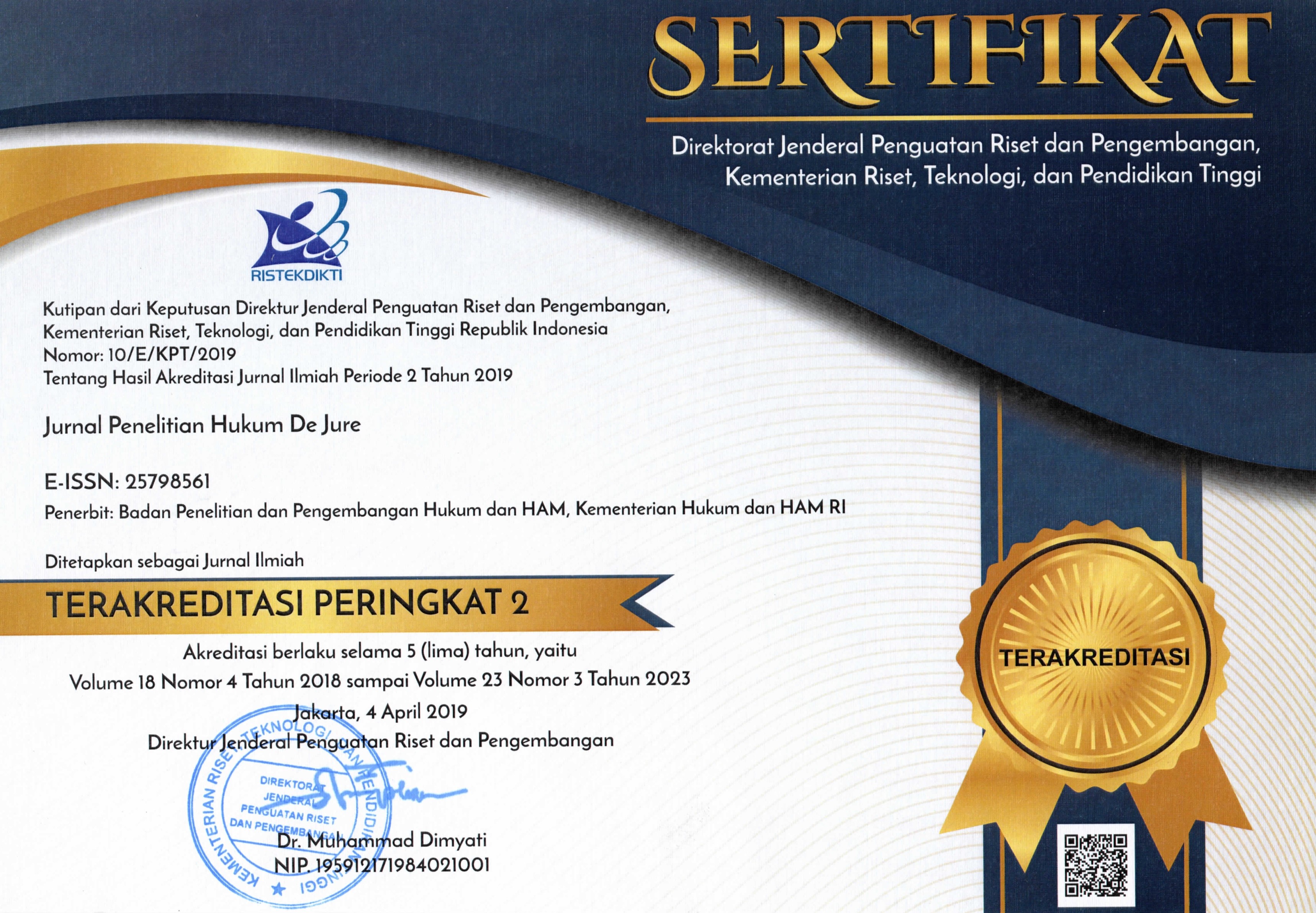The Criminal Liability of Corporations as Crime Perpetrators
Abstract
In terms of handling corporate crimes that culminate in "sentencing" or "giving punishment", corruption is referred to as a crime that has caused damage to life. However, this is not mentioned much in criminal law studies. In addition to sentencing, corporations that committed corruption must also return corporate assets to the state. This needs to be considered according to the philosophy of nature aequum est neminem cum alterius detrimento et injuria fieri locupletiorem. This philosophy means that no one can enrich themselves at the expense and suffering of others. This philosophy changes the source of this doctrinal principle, namely crime does not pay or crime shall not pay into an expression of resistance to crime perpetrators so that they cannot enjoy the results of the crime they committed. The statement of the problem in this paper is how is the philosophy of sentencing corporations that are perpetrators of corruption? This research used secondary data through literature study in the form of laws and descriptive analysis. The imposition of a criminal fine creates implications and juridical problems for corporations that committed corruption. The recommendation of this paper is to build an ideal model of sentencing corporation based on justice.
Keywords
Full Text:
PDFReferences
Tim Humas DPD, “Prof. Dr. Jimly Asshiddiqie: Universalitas Pancasila Harus Terus Kita Tata Agar Menjadi Payung Bagi Seluruh Rakyat Indonesia.” DPD RI DKI Jakarta. Last modified 2021. Diakses September 3, 2021. https://jakarta.dpd.go.id/index.php/public/news/detail/prof.-dr.-jimly-asshiddiqie-universalitas-pancasila-harus-terus-kita-tata-agar-menjadi-payung-bagi-seluruh-rakyat-indonesia.
Atmasasmita, Romli. Analisis Ekonomi Mikro tentang Hukum Pidana Indonesia. Jakarta: Kencana Prenada Media Group, 2016.
Coburn, Niall E. “Corporate Investigations.” Journal of Financial Crime 13, no. 3 (2006): 348–368.
Hanafi. “Perkembangan Konsep Pertanggungjawaban Pidana dan Relevansinya Bagi Usaha Pembaharuan Hukum Pidana Nasional.” Universitas Indonesia, 1997.
Huda, Chairul. “Asas Tiada Pidana Tanpa Kesalahan” Pelatihan Asas-asas Hukum Pidana dan Kriminologi serta Perkembangannya Dewasa Ini" (MAHUPIKI) bekerja sama dengan Fakultas Hukum UGM. Yogyakarta, 2014.
Koesoemahatmadja, Etty Utju R. Hukum Korporasi Penegakan Hukum terhadap Pelaku Economic Crimes dan Perlindungan Abuse of Power. Jakarta: Ghalia, 2011.
Marzuki, Suparman. “‘Dimensi “Kejahatan Korporasi” dan Reaksi Sosial.’” Jurnal Hukum 1, no. 2 (1994): 9–14.
MD, Mahfud. “Ceramah Kunci Ketua Mahkamah Konstitusi Republik Indonesia.” In Konferensi dan Dialog Negara Hukum: Negara Hukum Indonesia Ke Mana akan Melangkah, 62–63. Jakarta, 2012.
Muladi. “Demokratisasi, Hak Asasi Manusia dan Reformasi HURUM di Indonesia.” The Habibie Center. The Habibie Center, 2002.
Park, Sam, dan John Song. “‘Corporate Criminal Liability.’” American Criminal Law Review 50, no. 4 (2013): 729–764.
Reksodiputro, Mardjono. “Kemajuan Ekonomi dan Kejahatan.” In Kumpulan Karangan, 107. Jakarta: Universitas Indonesia, 1994.
Utrecht, E. Pengantar Hukum Administrasi Negara Indonesia. Bandung: FHPM, 1960.
Article Metric
Abstract this article has been read : 840 timesPDF file viewed/downloaded : 699 times
DOI: http://dx.doi.org/10.30641/dejure.2021.V21.311-320
Refbacks
- There are currently no refbacks.
Copyright (c) 2021 Evi Djuniarti

This work is licensed under a Creative Commons Attribution-NoDerivatives 4.0 International License.
Jurnal Penelitian Hukum De Jure Indexed by :











